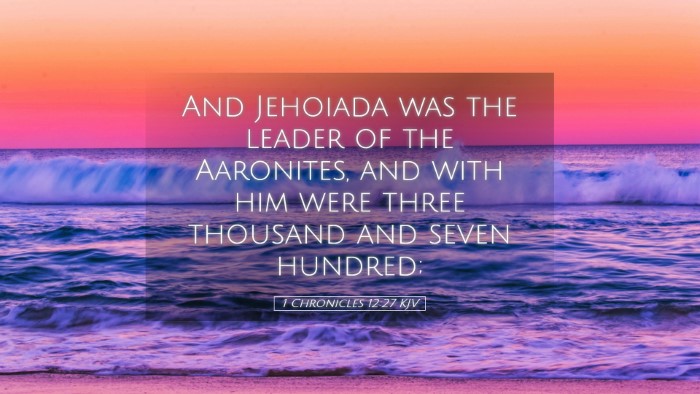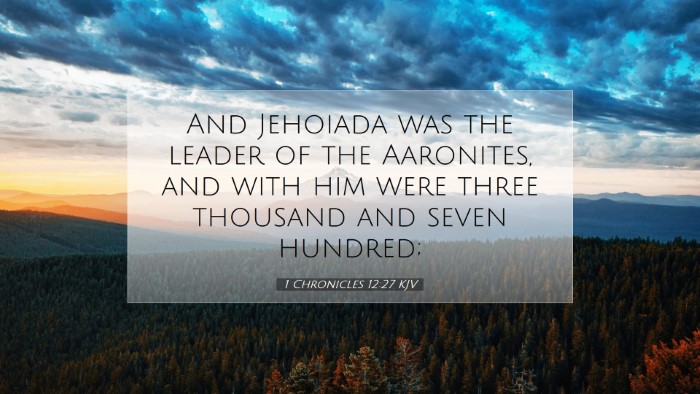Commentary on 1 Chronicles 12:27
1 Chronicles 12:27 states: "And Jehoiada was the leader of the Aaronites, and with him were three thousand." This verse highlights a specific aspect of the organization and leadership in the context of David's reign. The following commentary explicates the significance of this verse, incorporating insights from Matthew Henry, Albert Barnes, and Adam Clarke.
Contextual Background
The chronicles serve as a historical account of the reigns of kings in Israel, focusing on the lineage, leadership, and the organization of the tribes and priests. The reference to Jehoiada and the priests is critical as it identifies the substantial role of the priesthood during David's time. They were not only spiritual leaders but also took part in the political and military aspects of Israel's society.
Understanding Jehoiada's Leadership
Matthew Henry emphasizes that Jehoiada was not only a priest but had a significant role akin to that of a commander. His leadership over the Aaronite priests reveals a structured religious authority that played a key role in the political stability of David's kingdom. This underscores the harmony between spiritual leadership and civil governance at that time.
The Number of the Aaronites
Albert Barnes notes the significance of the number mentioned - “three thousand.” This indicates a well-organized priesthood capable of both leadership and service. Barnes elaborates that this signifies the importance of the priests in David's military campaigns, as they were responsible for leading worship, securing divine favor, and maintaining spiritual order among the soldiers.
Spiritual Authority and Military Might
Adam Clarke suggests that the number of priests who were aligned with Jehoiada indicated not just religious but also political power vested in the priestly line. Clarke highlights that during times of conflict, such figures were essential, acting as both advisors and leaders in the military ranks, reflecting the integral nature of faith in the life of Israel. This dual role also served as a reminder of Israel's covenant responsibilities.
Theological Implications
- The Unity of Leadership: The partnership between Jehoiada and David reveals the need for unity among different forms of leadership—spiritual and civil—providing a model for contemporary church and state relationships.
- The Role of Priests: This passage encourages an understanding of priestly duties in modern terms, as ministers today hold responsibilities that overlap with both spiritual guidance and community leadership.
- The Importance of Numbers: The mention of “three thousand” highlights the significance of numbers in a biblical context, indicating a substantial and mobilized force capable of performing significant tasks for the nation.
Applications for Pastors and Theologians
This verse provides a template for understanding how spiritual leaders can influence the broader societal context in which they serve. It emphasizes the need for pastors and church leaders to engage actively with their communities, recognizing their role beyond the purely spiritual. The collaboration between clergy and laity is essential for a thriving church.
Conclusion
In summary, 1 Chronicles 12:27 serves as a foundational text illustrating the dynamic interplay between spiritual leadership and communal governance. Through the insights of Matthew Henry, Albert Barnes, and Adam Clarke, we recognize the profound importance of the priestly role during David's reign, which resonates with contemporary discussions surrounding the integration of faith and service in modern society.


